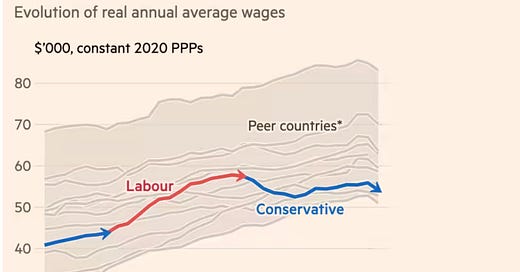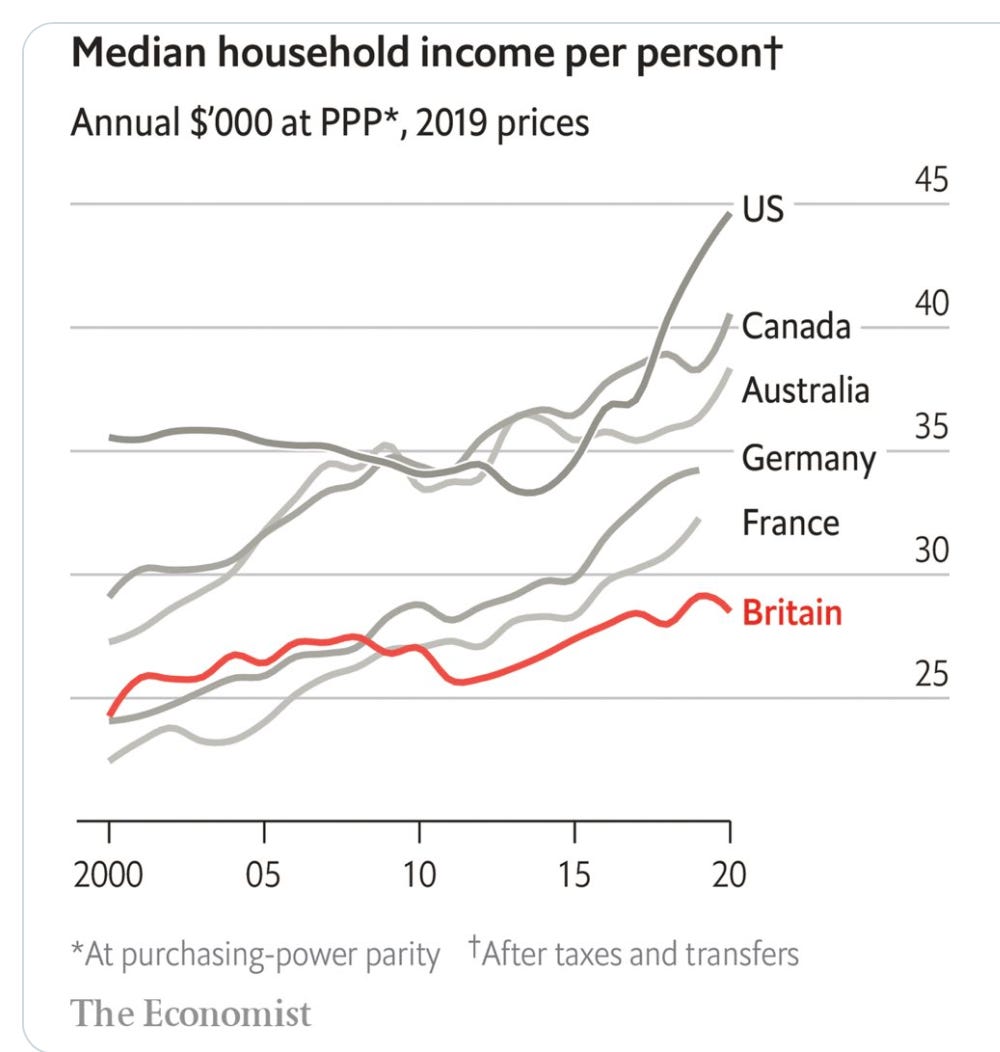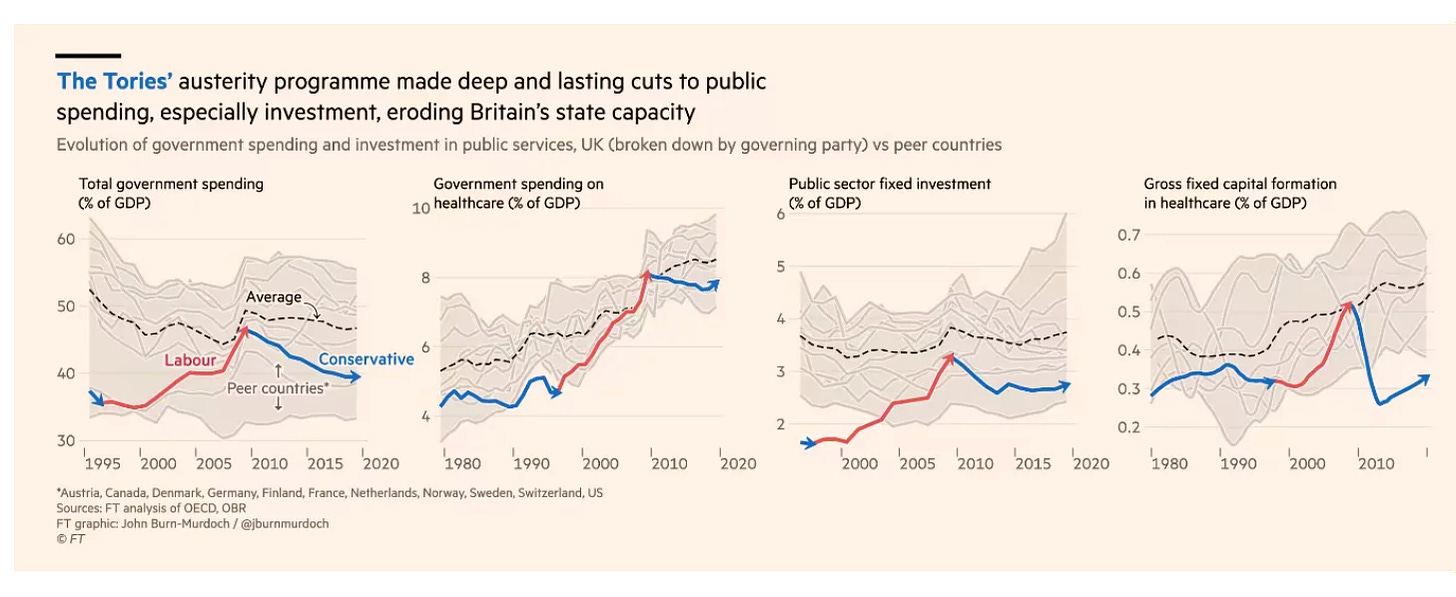Thinking About Adam Tooze’s Take on þe Absolute Decline of Britain, & BRIEFLY NOTED
For 2022-12-31 Sa
CONDITION: Historical Echoes of þe Spanish Civil War:
Perhaps the most useful to have heard in 2022:
W.H. Auden: Spain: ‘And the life, if it answers at all, replied from the heart
And the eyes and the lungs, from the shops and squares of the city
"O no, I am not the mover;
Not to-day; not to you. To you, I'm the
"Yes-man, the bar-companion, the easily-duped;
I am whatever you do. I am your vow to be
Good, your humorous story.
I am your business voice. I am your marriage.
"What's your proposal? To build the just city? I will.
I agree. Or is it the suicide pact, the romantic
Death? Very well, I accept, for
I am your choice, your decision. Yes, I am Spain”…
FOCUS: Thinking About Adam Tooze’s Take on þe Absolute Decline of Britain:
The extremely sharp and learned Adam Tooze—who has read and thought about everything, turns over his must-read Chartbook newsletter this week to… himself.
He has a very nice piece about British decline—and about how, this time, it really is very different, and pretending that this is the same sort of “decline” that Britons have been worrying about since Kipling’s Recessional is to miss the mark pretty much completely:
Adam Tooze: Nostalgia for decline in deconvergent Britain: ’The austerity squeeze of the Tory-led coalition in 2010 was not the first of its kind. But… the British economy in 2010 was no longer in the state of earlier decades. The 2008 shock was unprecedented and as Burn-Murdoch emphasizes the shocks that lay ahead were more dangerous…. This is indeed a new era. Declinist discourse always had an element of temporal confusion about it, but to continue to indulge in that shadow-boxing, in the face of discontinuities that register on the scale not of decades but of hundreds of years, is to reduce political and economic debate to national pantomime…
Let me note two more of Adam’s points. The first is that the extremely sharp (but I would argue not-wise) Perry Anderson especially misses the mark. He continues to claim that the particular interpretation of British relative decline that he has been pushing since the early 1960s—that Britain “modernized” too early and not enough—still have (if, indeed, they ever had) relevance:
Perry Anderson: Ukania Perpetua?: ‘Agrarian capitalism, controlled by large landowners…. Trade-unionism… timorously respectable and largely apolitical…. Nor… any disestablished intelligentsia.... Labour... administered the British state… contenting itself with provision of welfare... and nationalization of loss-making industries, without... structural encroachment on... capital.... Economic decline… traceable back to its early low-tech manufacturing base… the blows of two world wars… nominal victory in each case preserving rather than destroying accumulated archaisms…
Tooze is right and Anderson is simply wrong, as best as I can see. Whatever merits Anderson may or may not have had as an explanation of British relative decline from Benjamin d’Israeli through John Major, it does not apply to today.
The second is that Nicholas Crafts (I am really sorry we were never able to assemble a coalition to make an attractive offer for him to coe to Berkeley) and Terence Mills play Hamlet without the Prince, in that they neglect to focus on the role played by Tories in producing the last fifteen disastrous years:
Nicholas Crafts and Terence C. Mills: Is the UK productivity slowdown unprecedented?: ‘The current productivity slowdown has resulted in productivity being 19.7% below the pre-2008 trend path in 2018. This is nearly double the previous worst productivity shortfall ten years after the start of a downturn. On this criterion the slowdown is unprecedented in the last 250 years. We conjecture that this reflects a combination of adverse circumstances, namely, a financial crisis, a weakening impact of ICT and impending Brexit…
I concur with Adam’s judgment of Crafts and Mills: the financial crisis and the weakening impact on economic growth of Information and Communications Technologies hit everywhere. Fear of Brexit was not a thing until 2016. Certainly Brexit has been an additional catastrophe, but the sharp divergence from the growth path of the other Dover-Circle-Plus economies started in the late 2000s, and started even though Britain was not caught in the catastrophic euro straitjacket of continental Europe. You cannot explain what was different about 2010-2016 Britain by pointing to things that hit the Dover-Circle-Plus entire.
Its Tories what done it, as Adam cites John Burn-Murdoch saying:
John Burn-Murdoch: Britain’s winter of discontent is the inevitable result of austerity: ‘A decade of Tory spending cuts left the country vulnerable to the external shocks of the past two years…
And, of course, Nick Clegg done it, in giving the baton to the Tories without imposing any conditions whatsoever on their policies.
My view—which may be wrong—has been that Britain’s long relative economic decline since the heights of 1870 has been due to its persistent refusal to invest in its people and in its technology-driving industries. You can say that the first of these has cultural-ideological-political roots—Tories fearing that if people get over-educated they will not respect their betters, and Labour fearing that if people get over-educated they will not respect their parents—and you could be right. You can blame the second on the British Empire making it just too easy to to invest abroad and count on the power of the gunboats to make foreign investments safe. You can then say that those institutional habits persist to this day, and you could be right as well. Perhaps. Other things were surely at work as well. One of the good points in Anderson’s “Ukania Perpetua” is this one:
Markets were not self-redressing: centralized direction of one kind or another was needed to correct them. But of the four variants at work elsewhere—dirigiste planning in France, industrial banks in Germany, state-keiretsu coordination in Japan, corporatist concertation in Austria or Sweden—the necessary social agents were all lacking in Britain: neither its bureaucracy, nor its finance, nor its labour movement was equipped for the task…
Historically, the most successful of the… North Atlantic—the Global North—what I have decided the Dover-Circle-Plus economies… managed to figure out how to deal with the second-greatest market failure of capitalist economies. That is the complete and total failure of the market to recognize and properly promote the key economic treasure that is a country’s community of engineering practice. (Parenthetically, the absence from Anderson’s list of America’s combination of Hamiltonian government and continental market-scale is… rather odd.) The obvious way to try to reverse what Tooze correctly identifies as Britain’s no longer relative but now absolute decline is to essentially reverse everthing that has been done since the Tories took power:
Reverse austerity;
Re-progressivize taxes;
Prioritize education;
Rejoin the European Union;
Triple-down on government support for high-tech and engineering;
Support Greater London;
Plus:
Tax the rich of Greater London and the various Tory gentry of the shires to build the infrastructure that Britain ex-London so desperately needs.
In short, the growth agenda. But for real. Rishi Sunak could do that: He has 356 Tories versus 290 others in the Commons. Tell them its his way or the highway—that either they back him in a complete policy reversal, or he pulls the pin on the grenade and gets an immediate snap election from King Charles III, in which case they lose their seats. Tell them that sensible pro-growth policies might turn things around in time for the January 2025 election, but that every day radical pro-growth policy reform is delayed the window narrows.
Sunak won’t, of course. Instead, it will be Tory business-as-usual for the economy coupled with culture-war attempts to create a base of Handmaid’s-Tale counties outside of Greater London. That, of course, will be as poisonous to prospects for growth in Britain ex-Greater London as the similar Republican-Party culture-war creation of Handmaid’s-Tale red states in the United States.
Starmer might get his chance come 2025.
My only disappointment at Adam’s newsletter post was that I was hoping to get a preview of what the Resolution Foundation’s own policy recommendations are going to be. But, alas!, that is absent.
And you should really, really subscribe to Adam Tooze’s Chartbook:
MUST-READ: Chat-GPT vs. Google, Round I:
Gary Marcus: ‘George Hotz “[GPT] is what kills Google”. Google: Game on!… Round 1: Which country won the most Eurovision contests? Google on left; GPT on right. Not sure I want that much personality in my search results…
BRIEFLY NOTED:
ONE AUDIO: Chat-GPT Yet Again:
Ben Thompson & James Allworth: Chat-GPT
<https://overcast.fm/+Pj5N6YIAw>
ONE IMAGE: Lensa:
Very Briefly Noted:
Richard Milne: Møller-Maersk chief bows out after 40-year voyage: 'Søren Skou set to hand over the rein with best results in Danish group’s history Maersk’s chief described container shipping as both one of the main beneficiaries of globalisation and one of its biggest drivers…. It cost about $2,000 to transport a container from Shanghai to Rotterdam that could contain about 8,000 pairs of trainers…
Paul Krugman: Did the Tesla story ever make sense?: ‘Electric vehicle production just doesn’t look like a network-externality business…. Investors fell in love with a story line…. There’s a parallel here with Bitcoin…
Maurice Mitchell: Building Resilient Organizations: 'Neoliberal identity politics… a narrow tool used as a personal cudgel.... We must build resilient organizations that can weather internal conflict and external crises… structurally sound, ideologically coherent, strategically grounded, and emotionally mature...
Benjamin Ross: ‘Lengthy NYT post-mortem on how partisan polls sold 2022 "red wave" narrative to media gives just 3 words to paper's own (very large) role in this. When it was obvious at the time that the Times reporting distorted its own polls…
Toomas Hendrik: RT: Igor Lachenkov: ‘For Russians the “Russian New Year at the festive table” is the footage of ruined buildings in Ukraine. These are photos from Kyiv after today’s bombardment by russian rockets. This is how they "greet” us…
Francis Scarr: ‘Fantastic reporting from Steve to mark the end of this truly awful year: Steve Rosenberg: ‘Outside Gorky Park, along with festive fir trees, is a red star with the symbol of Russia’s ‘special military operation.’ As Russia prepares for the New Year holidays, I go onto the streets of Moscow to see how the invasion of Ukraine has changed Russia…
Kevin Beaumont: ‘I saw a toot about how Mastodon isn’t a suitable network for social movements… posted on a social network with 8 million accounts that has no adverts, is volunteer run, is open source, has no owner and is end to end free of big technology companies…
¶s:
Jorge Castaneda: AMLO’s False Promises: ‘Mexico’s president pledged to improve the economy, fight inequality and corruption, and strengthen democracy. As his six-year term enters its final stretch, it is already clear that he will fail to keep his word…. To most Mexicans, the small coterie of officials who governed Mexico between 2012 and 2018 seemed endlessly corrupt. In running against them, AMLO created the expectation that, finally, under his leadership, Mexico’s original and perpetual sin would finally be expiated…
Bronwen Maddox: Other democracies should beware taking pleasure in the UK’s travails: Voters in most developed countries feel that their contract with the state is fraying: ‘I can barely think of a meeting I’ve had since September that didn’t begin with jokes about Britain… “lasted longer than the lettuce”…. But these are rash quips if coming from other democracies. The joke may be on them, too…. “If you don’t have a political system that can make short-term sacrifices for the long-term good of the country, how can you expect your system of government to survive?” asked one senior Chinese official of a distinguished British former minister…
Alyena Batura: How to Compete in Unfair Elections: ‘he opposition contested the 9 August 2020 presidential election in Belarus… by: 1) presenting a credible alternative… 2) drawing on citizen-led initiatives… 3) involving citizens at every stage of the electoral process… and 4) wielding the regime’s electoral law against it…. The election… created conditions for future change, despite mass state-sanctioned violence…
Yuriy Gorodnichenko, Anastassia Fedyk, & Ilona Sologoub: No More “Chicken Kiev” for Ukraine: ‘Despite the massive material and military support the West has provided to Ukraine, the impulse to appease the Kremlin lingers, because many Western leaders fear the consequences of Russia’s defeat more than the prospect of a defeated Ukraine. But appeasement is a recipe for precisely the escalation leaders say they want to avoid…













The abiding sin of the Thatcherite Tories and the post-Reagan Republicans is the belief that government has a purely parisitical upon the private sector. This, of course, ignores the essential social infrastructure provided by government. Right neo-liberalism seems to have enjoyed a longer run in the UK, than in the US. This may explain why the US has not yet experienced absolute decline. However, give the Republicans another shot at control and we may get there.
You on Tooze: I assume that "reverse austerity" just means the other tax and invest points. If it means not narrowing the fiscal deficit, I dissent. I would add land use polices that I hear are even worse in UK than in US urban centers.